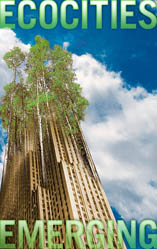At the end of the Ecocity World Summit 2008, Conference Director Kirstin Miller read a declaration. The text is as follows:
The San Francisco Ecocity Declaration
An ecocity is an ecologically healthy city. Into the deep future, the cities in which we live must enable people to thrive in harmony with nature and achieve sustainable development. People oriented, ecocity development requires the comprehensive understanding of complex interactions between environmental, economic, political and socio-cultural factors based on ecological principles. Cities, towns and villages should be designed to enhance the health and quality of life of their inhabitants and maintain the ecosystems on which they depend.
Ecocity development integrates vision, citizen initiative, public administration, ecologically efficient industry, people’s needs and aspirations, harmonious culture, and landscapes where nature, agriculture and the built environment are functionally integrated in a healthy way.
Ecocity development requires:
- Ecological security – clean air, and safe, reliable water supplies, food, healthy housing and workplaces, municipal services and protection against disasters for all people.
- Ecological sanitation – efficient, cost-effective eco-engineering for treating and recycling human excreta, gray water, and all wastes.
- Ecological industrial metabolism – resource conservation and environmental protection through industrial transition, emphasizing materials re-use, life-cycle production, renewable energy, efficient transportation, and meeting human needs.
- Ecoscape (ecological-landscape) integrity – arrange built structures, open spaces such as parks and plazas, connectors such as streets and bridges, and natural features such as waterways and ridgelines, to maximize biodiversity and maximize accessibility of the city for all citizens while conserving energy and resources and alleviating such problems as automobile accidents, air pollution, hydrological deterioration, heat island effects and global warming.
- Ecological awareness – help people understand their place in nature, cultural identity, responsibility for the environment, and help them change their consumption behavior and enhance their ability to contribute to maintaining high quality urban ecosystems.
Key actions needed:
- Provide safe shelter, water, sanitation, security of tenure and food security for all citizens and with priority to the urban and rural poor in an ecologically sound manner to improve the quality of lives and human health.
- Build cities for people, not cars. Roll back sprawl development. Minimize the loss of rural land by all effective measures, including regional urban and peri-urban ecological planning.
- With “ecocity mapping” identify ecologically sensitive areas, define the carrying capacity of regional life-support systems, and identify areas where nature, agriculture and the built environment should be restored. Also identify those areas where more dense and diverse development should be focused in centers of social and economic vitality.
- Design cities for energy conservation, renewable energy uses and the reduction, re-use and recycling of materials.
- Build cities for safe pedestrian and non-motorized transport use with efficient, convenient and low-cost public transportation. End automobile subsidies, increase taxation on vehicle fuels and cars and spend the revenue on ecocity projects and public transportation.
- Provide strong economic incentives to businesses for ecocity building and rebuilding. Tax activities that work against ecologically healthy development, including those that produce greenhouse gases and other emissions. Develop and enhance government policies that encourage investment in ecocity building.
- Provide adequate, accessible education and training programs, capacity building and local skills development to increase community participation and awareness of ecocity design and management and of the restoration of the natural environment. Support community initiatives in ecocity building.
- Create a government agency at each level – village, city, regional, national and international – to craft and execute policy to build the ecocity and promote associated ecological development. The agency will coordinate and monitor functions such as transportation, energy, water and land use in holistic planning and management, and facilitate projects and plans.
- In policy at all levels of government and in the decision making bodies of all institutions – universities, businesses, non-governmental organization, professional associations and so on – address in the plans and actions of those institutions specifically what can be done through the institutions’ physical design and layout relative to its local community to address global heating, the coming end of fossil fuels and global crisis of species extinctions.
- Encourage and initiate international, inter-city and community-to-community cooperation to share experiences, lessons and resources in ecocity development and promote ecocity practice in developing and developed countries.


